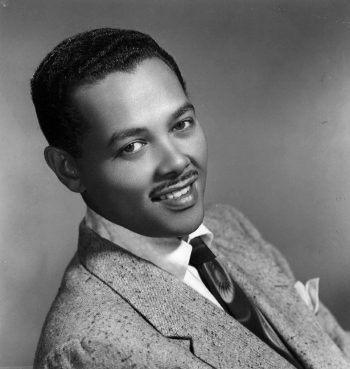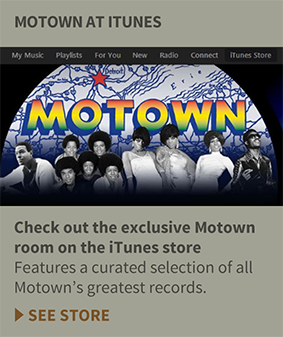A superstar of an earlier era as both a pioneering big band leader and a romantic vocalist – who The New York Times described as a “a suave bass-baritone whose full-throated, sugary approach to popular songs inspired singers like Joe Williams, Arthur Prysock and Lou Rawls” – the man disc jockeys nicknamed “Mr. B.” comes to Motown in 1965 and, although his three albums and seven single releases fail to chart, Eckstine records strong adult-oriented material and his distinguished presence on the roster adds to the company’s luster.
FAST FACTS:
- First hit: “Stormy Monday Blues,” as the featured vocalist for Earl Hines Orchestra in 1942.
- Biggest hit: “A Cottage For Sale,” recorded in 1945 to support his work as leader of his adventurous big band, becomes a Top 10 hit on both the R&B and Pop charts and reportedly sells a million copies.
- Biggest Album: Don’t Worry ’Bout Me, produced by Quincy Jones for Mercury Records in 1962, reaches the Pop LP chart and stays there for six weeks.
- Career highlight: On the strength of a string of eight chart hits in two years, Eckstine breaks Frank Sinatra’s attendance record at New York’s Paramount Theater in 1950.
- Emerging from the highly fertile Pittsburgh jazz scene, Eckstine has his first hits as the singer in Earl “Fatha” Hines Band and then forms his own group, the first bebop big band, featuring an incredible collection of future jazz greats: Dizzy Gillespie, Charlie Parker, Dexter Gordon, Miles Davis, Art Blakey, Fats Navarro, Gene Ammons and vocalist Sarah Vaughan. Eckstine sings and plays both trumpet and trombone.
- After disbanding his group, Eckstine embarks on a solo vocal career, becoming one of the post-WWII era’s biggest stars, reeling off hit after hit and attracting huge, enthusiastic integrated audiences. He influences fashion; long “Mr. B” collars are all the rage. Then a Life Magazine photo of him being embraced by a white female fan in 1950 produces a racist backlash in the U.S. South, short-circuiting his rapidly expanding career into films and TV.
Eckstine continues as a popular live attraction over the next decade, and in the late ’50s he tours with and mentors a young quartet from Detroit, the Four Tops, who back him vocally on stage.
- In 1965, thanks to his connection with the Four Tops, Mr. B signs with Motown, hoping to revive his recording career and refresh his image with more contemporary material. For most Motown employees, Eckstine is a hero from their youth and Berry Gordy hopes Eckstine can fuel his long-desired breakthrough into adult radio formats and record sales. All of Eckstine’s Motown releases feature magnificent vocal performances and some tunes remain in his live shows for years afterward.
- Eckstine’s first single release, “Down To Earth,” in May 1965, features the Tops on background. The song is co-written by Ron Miller, one of his first Motown credits in a stellar career that would produce, among other hits, “For Once In My Life.” It later becomes the title song of a Stevie Wonder LP.
- Eckstine joins the Four Tops on their tour supporting their smash “I Can’t Help Myself (Sugar Pie, Honey Bunch)” and, in performance, they reunite on stage. One of their live duets from the tour, “I’m Falling For You,” is eventually released in 1999 on the Breaking Through CD, a collection of the Tops’ unreleased early Motown jazz recordings.
- Mr. B makes his Motown LP debut with The Prime Of My Life, produced by Ivy Jo Hunter and Mickey Stevenson and aimed directly at the easy listening audience, combining standards, show tunes and original material from Motown staff writers. Another LP, Live At Lake Tahoe, is scheduled for release and then scratched. Eckstine issues two singles and his second LP, My Way, in ’66. A few tracks, like Smokey Robinson’s bouncy “The Answer Is Love,” place Eckstine in the Motown Sound.
- He has but one single released in 1967, “I Wonder Why (Nobody Loves Me),” a big beat shuffle produced by Harvey Fuqua and Johnny Bristol that undeservedly fails to chart.
Covering Stevie Wonder’s “Thank You Love,” Eckstine has a moderate “radio” hit that doesn’t chart in 1968. His final Motown LP, For Love Of Ivy, is released in November 1968. It comes out in the U.K. nine months later as Gentle On My Mind.
- A two-CD compilation of Eckstine’s Motown work, including all his LPs, singles and eight unreleased tracks, is issued in the U.K. in 2003.





